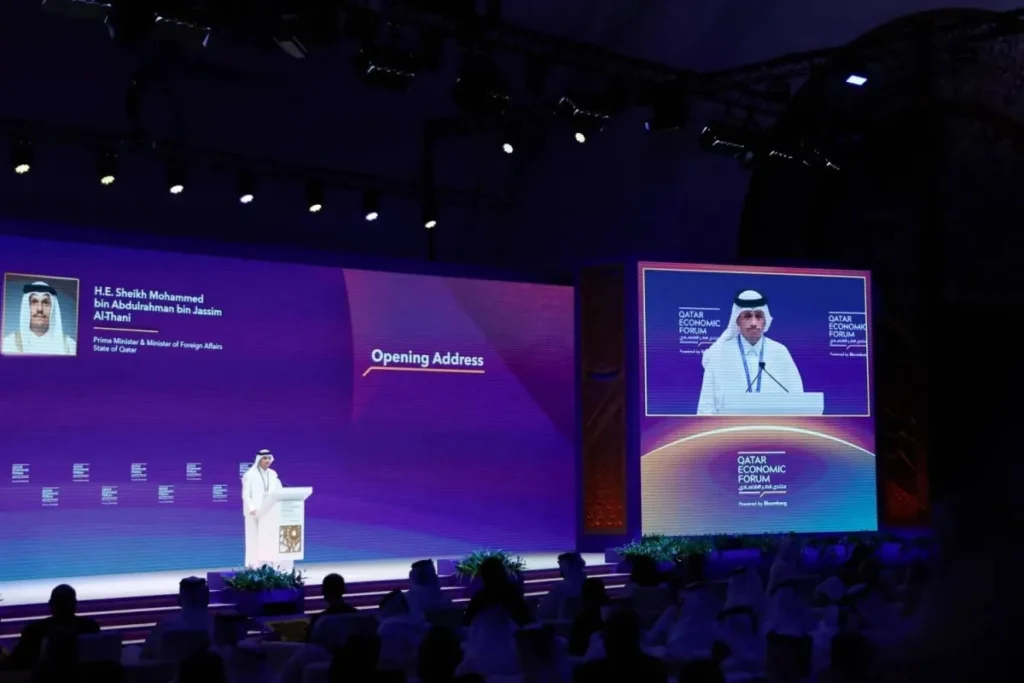Qatar’s Prime Minister and Minister of Foreign Affairs, Sheikh Mohammed bin Abdulrahman Al Thani, has said US President Donald Trump’s recent visit to the Gulf represents a strategic opportunity for the region.
He stressed on Tuesday that the relationship between Doha and Washington remains both “fundamental and strong.”
“The gift of a plane to President Trump reflects the depth of our bilateral ties,” he added.
His comments were made during the opening session of the fourth edition of the Qatar Economic Forum, held in collaboration with Bloomberg.
The high-profile event, which runs from May 20 to 22, brought together world leaders, business executives, academics, and entrepreneurs for wide-ranging discussions on the global economy.
This year’s forum is held under the theme “A Road to 2030: The Global Economic Transformation,” focusing on major shifts in the global economic landscape and the Gulf region’s role in shaping the decade ahead.
Addressing energy market dynamics, Qatari Minister of Energy Saad Al-Kaabi cautioned that oil prices falling below $60 per barrel could significantly reduce investment and strain electricity supply. He noted that the LNG sector’s planned expansion requires prices to hover between $70 and $80 per barrel to remain viable.
Oil is currently trading at around $65 per barrel, recovering from recent lows triggered by US-imposed tariffs on several countries. Temporary suspension of those tariffs and emerging hopes for a resolution to the Russia-Ukraine war have helped stabilize prices, Al-Kaabi said.
He acknowledged that the uncertainty stemming from those tariffs had caused notable concern in the energy sector.
On the issue of global gas supply, Al-Kaabi dismissed fears of oversupply, asserting that Qatar, one of the world’s leading LNG exporters, remains unconcerned. “Chinese and Indian buyers are in ongoing discussions to secure additional volumes from Qatar,” he said.
Al-Kaabi also announced that LNG exports from the North Field East project are expected to begin by mid-2026. Addressing potential competition with US gas exports, he remarked that American LNG, now the world’s largest, would primarily target Europe and South America, posing little challenge to Qatar’s dominance in Asia.
Meanwhile, Qatar Central Bank Governor Sheikh Bandar bin Mohammed Al Thani said that the direct impact of US tariffs on Qatar is “minimal,” noting that less than 2 percent of Qatari exports are bound for the US. However, he cautioned that declining global energy prices could weigh on the country’s financial budget and current account balance.
In a related development, Qatar Investment Authority (QIA) CEO Mohammed Al-Sowaidi revealed plans to at least double the fund’s annual US investments over the next decade. This builds on QIA’s earlier pledge to invest $500 billion into the US economy over the same period.
Al-Sowaidi also confirmed that QIA had recently redeployed investments into Elon Musk’s company, X.AI, in 2025. He stressed the importance of bolstering US manufacturing capacity and highlighted the shifting trade dynamics between China and the US as an opening for strategic investment in American supply chains.
The forum follows Trump’s recent visit to Doha, part of a broader Gulf tour, during which the US and Qatar signed joint agreements. According to the White House, the deals are expected to generate an economic exchange worth at least $1.2 trillion.
Qatar’s Finance Minister Ali bin Ahmed Al-Kuwari also took the stage, announcing Doha’s keen interest in investment opportunities in Syria. His remarks came after the US, with Saudi support, lifted all economic sanctions on Syria, a move soon mirrored by the European Union.
Al-Kuwari reaffirmed Qatar’s long-term confidence in Egypt as well, calling it a “promising investment destination.” Last month, during Egyptian President Abdel Fattah El-Sisi’s visit to Doha, Qatar committed to injecting more than $7 billion into the Egyptian market.



